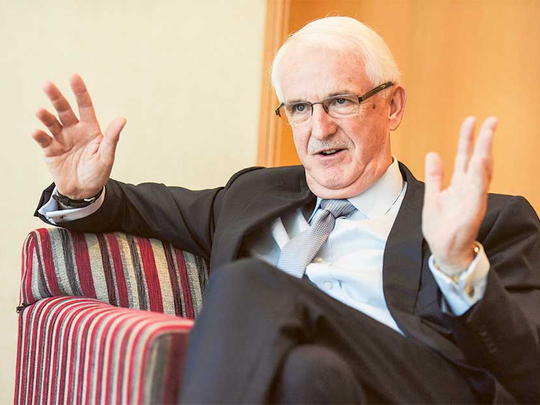
Dubai: Tourism supports one in every eleven jobs worldwide, and contributes 9.8 per cent of global gross domestic product (GDP), according to research by Oxford Economics for the World Travel and Tourism Council (WTTC).
Those headline figures are the first things WTTC chairman Gerald Lawless mentions in an interview with Gulf News at the Jumeirah Beach Hotel.
Lawless’ message is clear: tourism isn’t simply about holidays. It’s about boosting economies.
It’s something he’s seen first-hand in his role during his 18 years as Group President and CEO of Jumeirah Group, a position he retired from in January 2016, and in his current role as head of tourism and hospitality at Dubai Holding.
“It’s growing all the time. Travel and tourism is growing at about 4.6 per cent per annum,” he said. “In Davos a couple of years ago we celebrated that 1.2 billion people took an international journey in 2014. That’s gone up to 1.4 billion in 2015.
“As more and more wealth is created globally, and as more and more people come into the middle class, where they can afford international travel, as we can see outbound from China, it’s so aspirational for people to want to travel.”
While the industry itself is vulnerable to economic and geopolitical disruption in the short-term and on the local scale, Lawless says it is a resilient sector.
“Tourism has a great ability to bounce back, and it bounces in different ways. It bounces back sometimes by looking for new markets that are not as sensitive as other markets, or that have a high desire to travel — there are over 100 million outbound visitors now from China on an annual basis, and that’s growing at quite a rate.
“I’ve seen the atrocities of terrorism, but I’ve seen more and more bounce-back. Paris has been going through a difficult time for many reasons, but a big reason was the attacks, but it will bounce back. One of the reasons is hotels aren’t going anywhere. You can’t put a hotel on a plane.”
“The responsibility for all of us in tourism is first of all to let governments know how beneficial tourism is for their GDP, for their economies, and then work closely with authorities to make sure travel is as safe and secure as it can be.”
The WTTC, WTO and the World Economic Forum have been working with governments to ease the process of visa applications.
“What we’re looking for is that e-visas — electronic visas — should become the norm for visa issuance for all countries.”
Lawless said visas are a government’s way of ensuring a traveller is a suitable person to visit, but that depended more on the individual than their point of origin, and easing or waiving applications helped boost tourism.
“The whole issue of data sharing, and how you can do that in such a way that people don’t feel their data protection rights are being invaded, is very important to all of us. We believe that there’s an opportunity here for governments and blocs of governments to work with each other.”
He cited the US Electronic System for Travel Authorisation (ESTA) system and Schengen visas as models.
“From our point of view within the industry it facilitates travel, but it facilitates it in a secure and safe manner, and we’re not interested in trying to ask governments in trying to facilitate it in any other way than one that would also enhance security and safety.”
Governments would also find tourism a useful solution to issues of youth unemployment, he said.
“Our employment is extremely beneficial for young people. If you look at some countries in southern Europe, they’re still looking at 40 per cent unemployment for under 25 year olds, which is a disaster waiting to happen if we don’t address it. Our industry is one of the best industries with which to address youth unemployment.
“I was very pleased to see here the DTCM [Dubai’s Department of Tourism and Commerce Marketing] looking at a school for hospitality, because this is exactly what’s needed. It’s not only university education — yes that’s important — but also giving people the opportunity to do apprenticeships, to do internships, to attend vocational education institutions and then become totally equipped to work for us.
“It’s been one of the great features I’ve always believe of hotel schools — I went to a hotel school in Ireland — is that they’ve always had a very strong mix of the experiential side of actually working in a hotel as well as being educated in how a hotel operates and the business of hospitality.”
“We have the Emirates Academy here in Dubai where we have a bachelor’s degree in hospitality administration and a master’s degree in international hospitality management, but we still use internships all the way along, so when a young person graduating goes into a hotel in a junior managerial position, they would have already worked in the pot wash and the different parts of the hotel — maybe not quite as much as in my day, when 50 per cent of your time out of four years was spent working, and rightly so.
“The business of hospitality is quite a science as any other business, and that should be the way it is, but absolutely the fact that you’ve worked in the business that you’re going into at all levels helps greatly in leading the business, and this is something that I think a lot of university courses now are looking at as well in terms of their own particular area that internships are so important, and I see that more and more internships are being facilitated within the United Arab Emirates, which is great, because we can get more and more young people to come and experience the business.”
The UN World Tourism Organisation has designated 2017 the Year of Sustainable Tourism for Development, which will be launched at the Feria Internationale de Turismo in Madrid from January 18 to 22.
“Within travel and tourism we fully understand our responsibility with regards to sustainability,” Lawless said. “We want tourism to develop, we want the global economy to develop. We also recognise that the contribution of travel and tourism is particularly relevant in developing countries.
“We see what this does in a very positive sense for communities — giving an example in remote areas, if you look at the Serengeti and Maasai Mara areas of Africa, in Tanzania and Kenya, from my own experience... the tribesman actually come to meet with the guests on a daily basis. Our children were young at the time, and they took them and talked to them about their own traditions and customs. Of course, what this is doing apart from just giving employment in the Maasai Mara, is making them very aware of their own culture and their own traditions. They become very proud of it, and want to preserve it — but preserve it in a real way, not put it in a museum, and really have a livelihood out of it.
“And if the Maasai Mara tribesman didn’t have tourism to supplement their earnings, they would have to encroach more and more into the areas reserved for wildlife, and we’d have less and less wildlife. So this is the direct benefit of tourism.
“And tourism has benefits in developed areas — look at Europe, look at what tourism has done for Dubai.”












